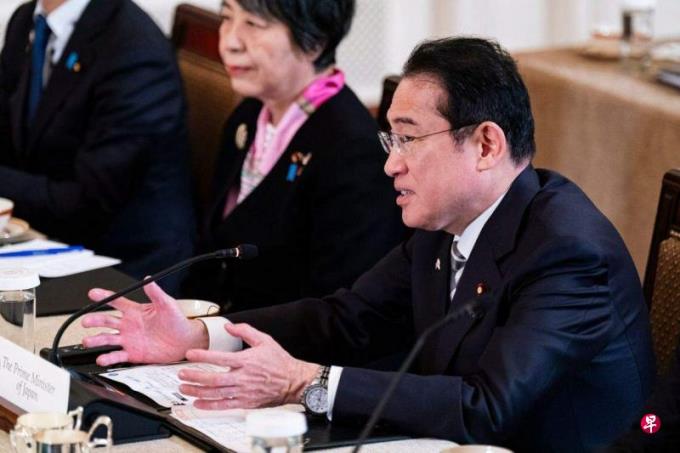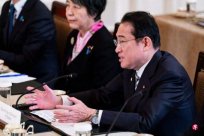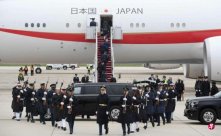
As the second largest and fourth largest economy in the world, China and Japan, shoulder important responsibilities in leading the region towards the better overall international relations.The core of the China -Japan strategic dialogue is the strategic cognitive framework. The establishment of Sino -Japanese relations that meets the new generations is to find the common point of cognition.
Japan ’s Foreign Minister Uenagawa Yoshiko recently reported to the cabinet the 2024 Foreign Blue Book, which reflects Japan’ s most authoritative documents in other countries ’cognition and corresponding policy positions.According to reports, after five years of the Blue Book, the strategic partnership positioning has been re -constructed in China for the first time.This should have been a positive trend, and the Chinese ambassador to Japan Wu Jianghao also mentioned last month.However, the Blue Book continues its previous expressions in other cognitive and policy positioning of China, defining China as the most significant strategic challenge.A spokesman for the Chinese Ministry of Foreign Affairs stated and resolutely opposed.
Just two weeks ago, the Japanese Prime Minister Kishita Tianshio gave a speech in the US Congress, and the major transformation of Japanese defense policies was linked to China as the most significant strategic challenge in Japan;EssenceIn China, on the one hand, Japan wants strategic mutual benefit relationships, and on the other hand, it will adhere to the most significant strategic challenges of China ’s cognition and adhere to the unprecedented unprecedented strategic challenges, and rendering China's threat to cognition.
The strategic cognitive framework of "Three Worlds"
In recent years, Japan's statement in China's threat cognition sometimes even surpasses the United States, which has a great challenge for the development of Sino -Japanese relations.Some analysts believe that this is the result of the extreme right of Japanese politics, and some believe that the United States encourages Japan to fight against China.Cognition in international relations is often default to mutual understanding between the country and the country. For example, the cognition of Sino -Japanese relations is the mutual awareness of the two countries.The author acknowledges that mutual cognition constitutes a part of strategic cognition, but the more fundamental core is the basic cognitive framework for the structure of the overall international relations and the future direction.
At the end of 2012, after the second administration of Shinzo Abe, Japan began to believe that the international order of the American independent in the United States after the Cold War has changed.And arguments with lack of international leadership.
After Kishida was in power, the above cognition was further strengthened.In 2021, the Bayeng government retreated from Afghanistan; in 2022, the Russian and Ukraine War broke out. Although the United States launched a severe economic sanctions against Russia, it did not win global support.decline.At the same time, the United States positions China as the biggest competitor, which means that the United States is facing huge strategic pressure on "three -sided operations" at the same time in Europe, the Middle East and Asia.
After the outbreak of the Russian and Ukraine War, Japan's strategic thoughts have changed significantly. Last year, the strategic cognition of three groups in the world gradually formed: Democratic National Group based on the United States, Japan, and Europe, represented by China and Russia,The authoritarian national group, as well as the vast number of emerging national groups.The basic judgment of Japan's international relations and trends is that the competition of geopolitical powers is the main characteristic of international relations in the new era. Sino -US confrontation will exist for a long time, and democratic camp division will be the main line.
"Three Ring Diplomacy" and "Strategic Opportunity Period" thinking
In 2023, the Japanese diplomatic blue book believes that the international community has entered a period of historic transformation.Judging from the above strategic cognitive framework, Japan believes that the international order change provides a period of strategic opportunities for itself.The relatively declined strength of the United States and the long -term nature of Sino -US confrontation have provided opportunities for Japan to play leadership in the region, so as to change the reality of belonging to the United States after the war, occupying strategic highlands in the new regional order.To this end, Japan needs to carry out "three -ring diplomacy" accordingly.
The first ring is the strengthening of the Japanese and American alliances. Through its own defense capabilities and relaxation of related legal systems, they can realize the aimalized alliance.Emphasize the mechanism of the four countries in the United States, Japan, and Australia, the three sides of the United States, Japan, South Korea, the United States, Japan, and the Philippines. This may make the original US single center in East Asia's US single center -wheel spoke framework into the United States and Japan.Relations of global southern regions.In 2023, Kishida visited the four African countries four African countries four African countries in Egypt, Ghana, Kenya, and Mozambique in front of the Hiroshima Summit of the Seventh Kingdom Group.According to reports, the Japan -Central Asian Summit will be held this year. The main purpose is to pull the majority of global south to the west.
The above -mentioned three -ring diplomacy reflects Japan's sense of existence and influence on the setting of international agenda setting and the shaping of the right to speak, and "focusing on Chinese risks" has become an effective lobbying tool.In the name of compensating for lack of leadership in the United States, Japan has the heavy responsibility of regional security.
Abe has proposed "three things to say", Taiwan has something to do, Japan has something, and the Japanese and American alliances are incident; Kishida has repeatedly proposed that today's Ukraine may be Tomorrow's East Asia.This is essentially Japan's strategic direction, and it must develop towards peer -to -peer and normal Japanese and American alliances.Strengthen Japan's deterrence, increase defense funds to 2%of GDP (GDP), and further relax weapon export restrictions, etc., can all use the needs of Chinese challenges to justified.Japan believes that as the only Asian country in the Seventh National Group, it must lead Europe and the United States in China, so that they will not lose their concern about Asia due to Ukraine and the Middle East issues. Last year's Hiroshima Summit also set up how to deal with China.Aired.In the diplomacy of Japan, Japan emphasizes that the rule of law is based on the rule of law, and it is also linked to the discourse system that has criticized China to unilaterally change the status quo and challenge the rules based on the international order in China. It aims to obtain more emerging countries resonance.
Effective strategic dialogue between China and Japan
From the perspective of the strategic cognitive framework, the upgrade of negative cognition of China in China in recent years is not simply the result of having the mood of China or political right.Good China -Japan friendly diplomacy can solve problems.Since Japan has a strategic decision to be a strategic decision to cognitive shaping and diplomatic schedule, it has a question: Is it necessary for the Sino -Japanese dialogue?The author believes that Sino -Japanese relations must adhere to dialogue and need high -level strategic dialogue.
In November 2023, the heads of state of China and Japan met in San Francisco in San Francisco in the United States one year to re -confirm the positioning of the relationship between the two countries that comprehensively advanced the relationship between strategic reciprocity.relation.
How can we make the consensus and commitments of the state and Japan's strategic reciprocity relationship, and truly implement it in action. The economic interests are not enough, and it is indispensable to actively find the strategic cognitive intersection point.The strategic cognitive framework of the three worlds described earlier, as well as the three main pillars of the main line and trend of the development of international relations (that is, the competition of geopolitical powers, the long -term existence of the Chinese and American confrontation, and the division of democracy against the authoritarian camp)There are great knowledge and practice loopholes, which can not stand the debate.
Although Sino -US relations have continued to be tight, high -level exchanges have continued. Important American cabinets have visited China one after another last year. This year, Treasury Secretary Yellen visited China again. Secretary of State Brills also visited China.Strategic communication between China and the United States, Wang Yi, director of the Central Foreign Affairs Office of the Mainland Government, and Shalvin, a common safety affairs consultant in the United States, continued to meet in Vienna, Thailand and other places.
At the same time, although there are differences and noise between China and Europe, the interaction has been quite frequent this year. According to reports, Chinese President Xi Jinping will also visit France in May.In contrast, no important Japanese cabinets have visited China.From the perspective of Japan, Japan -Russia relations are basically cut off. If the relationship between neighboring countries with another Permanent Security Council is a neighborhood, it means that Japanese diplomacy will be quite passive.Is China and the United States long -term confrontation?It is an inevitable long -term trend. It is not doomed. Fixed strategic cognition to the confrontation of a large country and will lose its strategic opportunity.Even the Harvard University professor of Harvard University, a professor of Harvard University, who created the "Xiu Xiddid Trap" (that is, the power transfer process often triggers the war of the great power war), also said that Sino -US confrontation is not inevitable.
Camp division is not the development trend of international relations
As the Ayanian country represented by the global south of the region, Indonesia is elected President Plabovo, and China is the first station of the first visit.Wang Yi met Laos and Vietnam Foreign Ministers in Guangxi, and China and Asia's Da'an were the largest trading partners for four consecutive years.Earlier this year, China and New, Malaysia, and Tae -free visa.
camp division is not the development trend of future international relations. Most countries will not be interested in the New Cold War.If the camp division is divided as a strategic cognitive framework, it will invalidate valuable diplomatic resources.
The most fundamental feature of future international relations is the rise of the group in the south of the world, and the awakening of international political awareness. As long as the majority of human countries are unwilling to participate in the confrontation of large powers, the new Cold War cannot be established.As the second largest and fourth largest economy in the world, China and Japan have shoulder important responsibilities for leading the region in the direction of better overall international relations.
The core of theChina -Japan strategic dialogue is the strategic cognitive framework. Establishing Sino -Japanese relations that fits the new generations is to find the common point of cognition.
The author is an associate professor in International Relations of Niigata University in Japan




